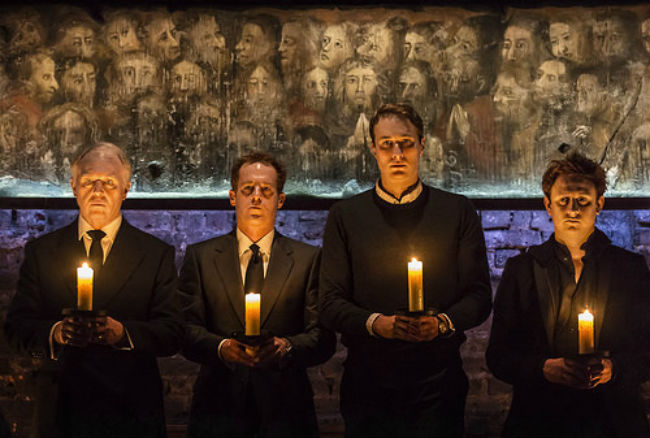@ Festival Theatre, Edinburgh, until Sat 21 Nov 2015
It’s a play that could have been written any time in the past few decades, but until the inevitable occurs, King Charles III is only going to get more potent by the year.
In the unspecified, but not too distant future, Charles, our kingdom’s heir, finally accedes to the throne on the death of the beloved Queen Elizabeth II. Balancing grief for a lost parent with the sudden rush of power is a problem all monarchs encounter, but Charles’ situation is particularly troubled – after a lifetime in waiting, is he now fit for the job to which he was born?
Mike Bartlett‘s play, directed by Rupert Goold for the Almeida Theatre, paints Charles’ predicament, quite reasonably, as Shakespearean tragedy. The parallel doesn’t stop at the subject matter either; Bartlett’s script is also written in Shakesperean iambic pentameter. Despite the modern language, the flavour of the piece is unmistakeable – this is pitched as epic historic drama. Even the bare castle walls of the set, and the Latin choral singing that opens both acts lend it a classic air.
The tactic is a smart one, but the problem with writing like Shakespeare is not being Shakespeare. For anything other than parody, it’s the devil’s own task trying to match his inventive phrasing and economy of language. While 80% flows seamlessly, and there are many pleasing lines, dead syllables stand out like sore thumbs. Something is described as being a “mix-éd bag” (with three syllables instead of two), “did”s get used to create past tenses (as in “I did go”). It happens not enough to be a feature of the piece, but too often to drift by unnoticed – a kind of awkward middle-ground. It feels used to “solve” a tricky line, rather than for it’s own sake.
Ancient and modern rub uncomfortably against each other too. Being “raped by Primark” might well be the kind of “bantz” that toffs use to describe each other’s appearance, but even if you forgive the use of the language on those grounds, it’s an ugly linguistic fit.
As for the plot, the play takes the populist stance that Kate and Wills would make a better fist of the monarchy than Charles and Camilla. This is a fair premise, and sets up a variety of tricky confrontations between characters. Charles, convincingly played by star turn Robert Powell, proves well-meaning, but naïve and impractical, vetoing a Parliamentary Bill by withholding Royal Assent.
In his stubbornness, he becomes increasingly isolated from his politicians, advisers and family, supported only by the ever-loyal Camilla (an underused Penelope Beaumont). Meanwhile, Kate (Jennifer Bryden) is portrayed as an ace manipulator, the power behind the throne, egging on the more measured William (Ben Righton) to deal with his father’s intransigence. They’re both very believable, as is Richard Glaves, providing the laughs as a dippy version of Harry, although his relationship with a fictional republican rebel called Jess (Lucy Phelps) grows a little implausible.
The two party leaders make weaker characters – Tory opposition leader Stevens (Giles Taylor) and Labour Prime Minister Evans (Tim Treloar). To avoid depicting real-life politicians, other signifiers have been used. Evans is a Welsh radical of the old school, raring for a fight. Treloar is fine for the role, but it’s an anachronistic choice of character for a modern Labour leader.
Parliamentary procedure seems an odd choice of storyline too. Charles may well be a man with views on the ancient role of the monarch. He’s clearly a man of strong convictions. But it seems unlikely he’d risk it all on the cause he does here. Moreover, bizarre constitutional conventions can be fascinating, but they don’t have the drama of, say, a regicide – problematic when you’re aspiring to the weightiness of The Bard.
Regardless, the play entertains, and in its final few scenes reaches a rounded and satisfying climax. Wills’ final confrontation with Charles is particularly powerful. Powell’s voice, whether by accident or design, now sounds weak and faltering in verbal battle with the younger Righton – only fitting given the situation. Scenes of pomp and circumstance and some wonderful choral pieces tick all the right boxes too. There’s definite merit in this treatment of the subject, and who is to say history won’t bear out some of the suppositions made, but the play seems reluctant to commit fully in a number of ways.


Comments